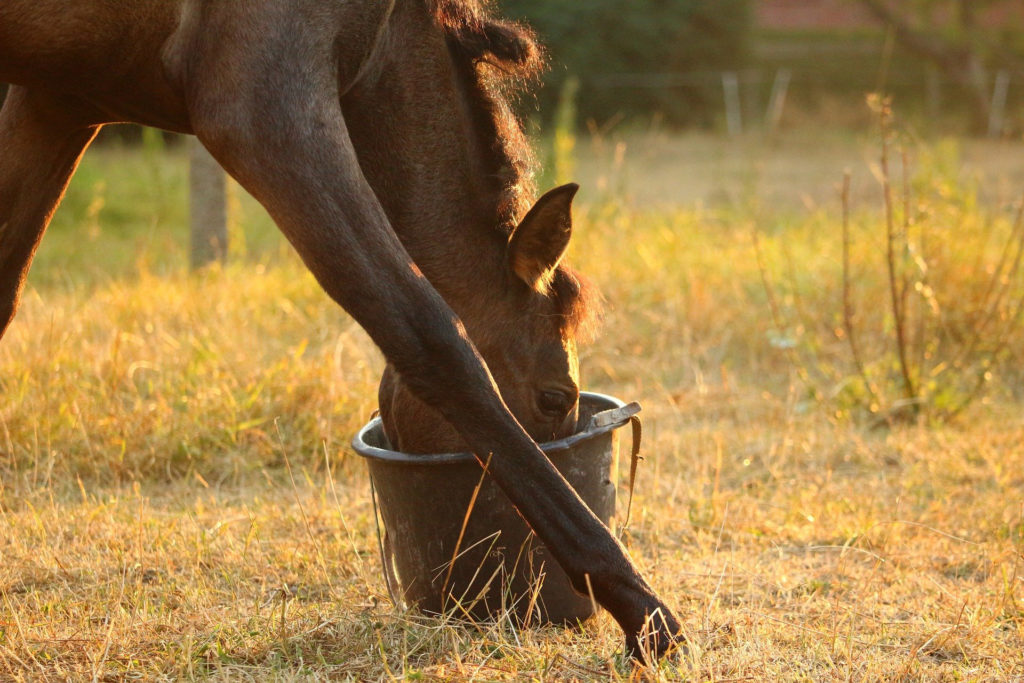If you are a new horse owner you may not be sure how much your horse should be drinking and whether or not they are drinking enough. You may also be concerned if your horse stops drinking as much as it normally does or if they refuse to drink at all when you offer them water. While this is a common concern for new horse owners, veteran horse owners may not be completely sure what to do about it either. Knowing how much water your horse needs each day is very important, as well as knowing what factors come into play when it comes to your horse’s need for water. The consequences of a dehydrated horse can be so devastating and knowing what to look for and what to with a dehydrated horse can be very beneficial.
Why Is Their Consumption of Water So Important?
Horses need a large amount of water each day, and there are a number of factors that can make them need even more. Water makes up 70 percent of a horse’s total body weight and they can drink as much as 1 gallon per 100 pounds of body weight they have. At first glance that may not seem like a lot, but if you consider an average size Quarter Horse is about 1500-2000 pounds they can be drinking 15-20 gallons or more depending on things such as weather and activity. An average horse sweats about 2-3 gallons. Not only is their water consumption important, but making sure they don’t get dehydrated is crucial is maintaining their health both short-term and long-term. Unfortunately, this isn’t always in your control. There is an old saying known as “you can bring a horse to water, but you can’t make them drink”. This saying could not be more true, and as frustrating as it may be knowing the different factors that can affect their consumption of water can help you reduce stress and help your horse stay healthy.
The best way to monitor your horse’s water consumption is to water them out of a trough or bucket and pay attention to the levels everyday you go out there. Also make sure the waterer does not have a leak or other critters drinking from it because that can affect the levels.

Do Their Needs Change Depending on the Weather?
One factor that can affect the amount of water your horse needs is the humidity and temperatures in the area they are in. Just like people, the higher the humidity and the higher the temperature is outside the more water they drink. It is very crucial that horses always have access to water no matter where they are, but it is even more important when the weather is hot.
Do Their Needs Change Depending on Activity Level?
In addition to weather, the horse’s activity level can also play a role in how much water is needed. The more they exercise the more water they are going to need. The amount of water they need can also change depending on what kind of forage they are on. Dry feed such as hay and dry grass have very little to no water at all in the feed and causes the horse to need more water and more regularly than they would if they were on pasture grass and other feeds.
Signs Your Horse Is Dehydrated
Making sure your horse is hydrated enough can be very difficult especially during the winter months where the water has a tendency to freeze or semi-freeze. However dehydration can be extremely dangerous for horses, even more so than other animals. With that said, knowing if your horse is dehydrated can be even more difficult especially when you don’t know what to look for. It can be confusing knowing if your horse is not drinking because it doesn’t need more water or if it’s because they have enough water.
Some signs you can watch for include:
- Their gums are dry and a pale pink or white color
- Their eyes and flanks are sunken
- When the skin on the the horse’s neck is pinched it doesn’t bounce back
- Your horse may be panting without any exercise or activity
If you notice any of these warning signs with your horse there is a good chance that they are dehydrated. While there are many reasons why horses can become dehydrated other than a lack of access to water, it is a good idea to have them checked out regardless of the reason to prevent further damage.
Dangers of Dehydration in a Horse
Dehydration in a horse can be very dangerous for their overall health both short-term and long-term. Water is crucial for their digestive system and helps their food continue through their system more efficiently. Dehydration can also cause diarrhea in the animal and reduce electrolytes in their system which can eventually lead to kidney failure. Colic is also a common condition among dehydrated horses and can be fatal if not treated quickly.

Leave a Reply